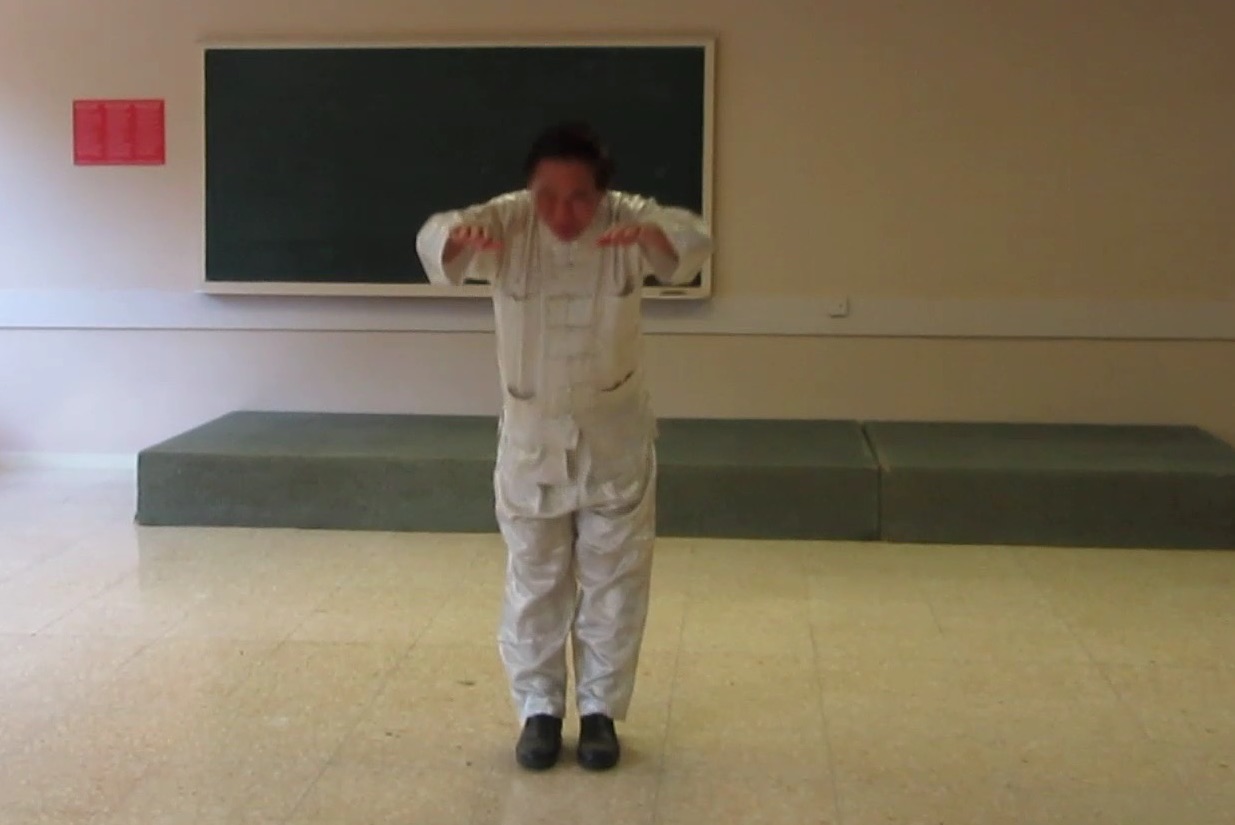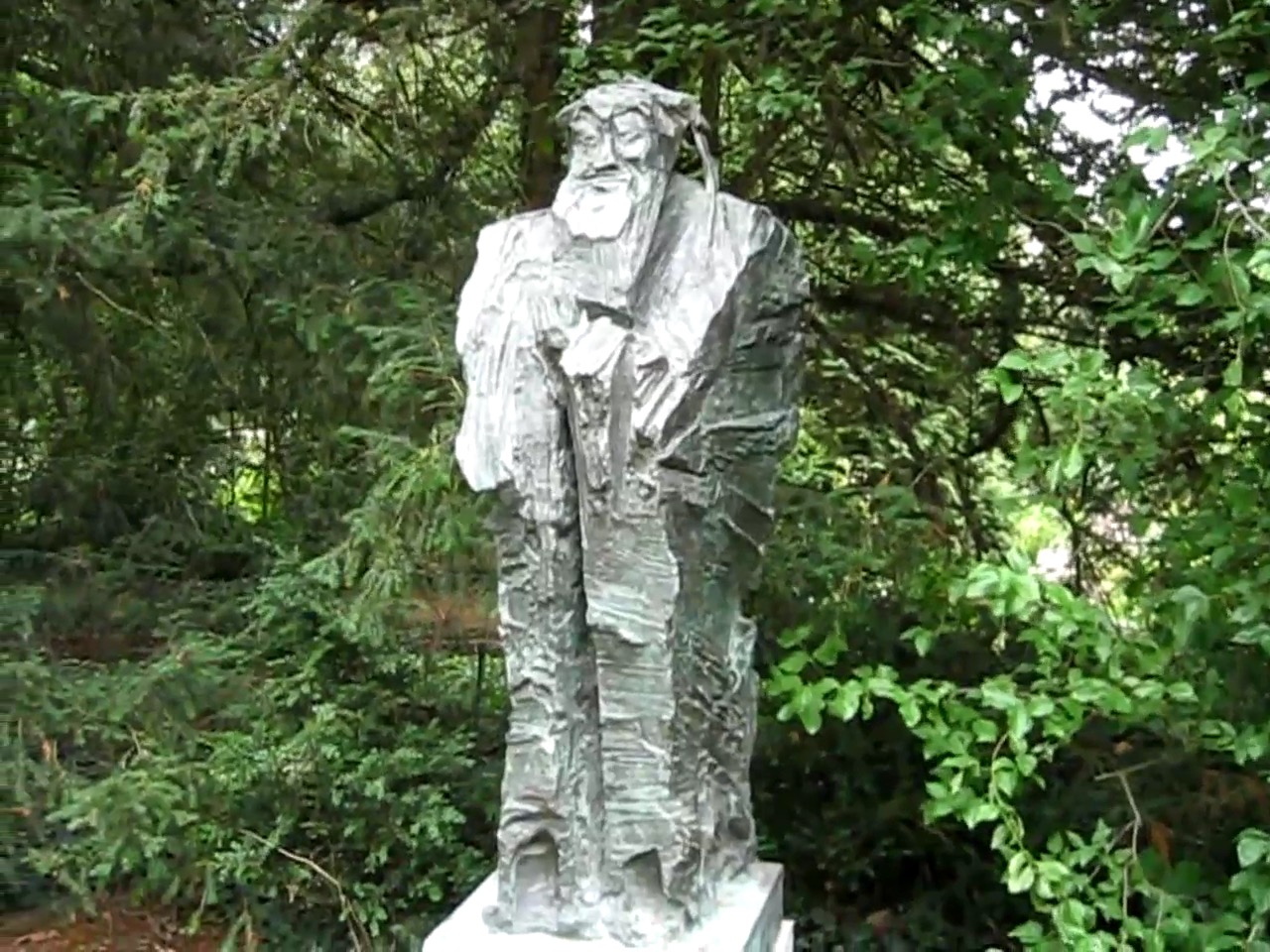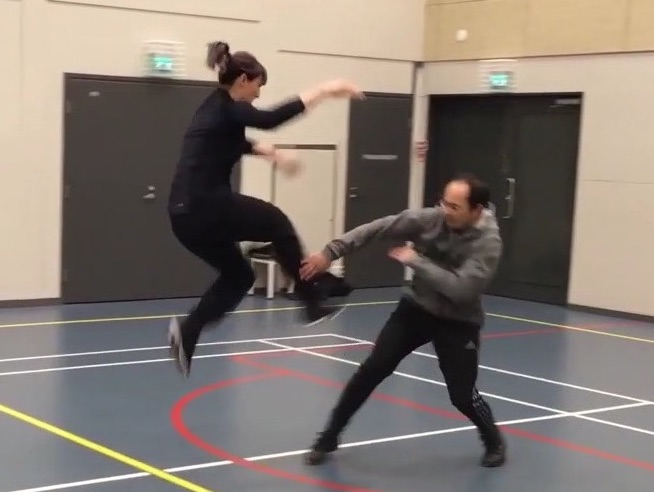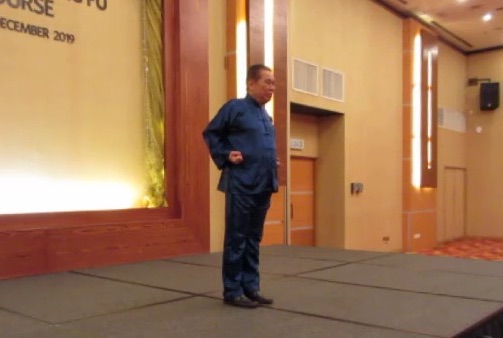SELECTION OF QUESTIONS AND ANSWERS
May 2021 PART 1

Double Dragons
Question 1
Please what are the benefits of the 18 Jewels?
— James, England
Answer
Here is a list of benefits of the 18 Jewels. The exercise is stated first, followed by its main benefit. Please note that there may be more than one benefit, but the main benefit is given below.Like Self-Manifested Chi Movement and 5-Animal Play, the main purpose of the 18 Jewels is to overcome illness. Once there is vigorous chi flow, the illness will be overcome, as it is an innate characteristic of chi to flow to where it is needed most. In some cases, it may take some time when the disease-causing agents are hidden in remote parts of a patient's body.
- Double Dragons -- send chi to the whole body, causing a forward-backward flow.
- Fish Flip -- send chi to the whole body, causing a forward-backward flow.
- Dancing-Fairy -- send chi to abdominal area and legs.
- Swinging Hips -- send chi to abdominal area, causing a circular flow.
- Bear Walk -- send chi to legs. It has helped many people who could not walk before, to walk again.
- Immortal Takes off Shoes -- send chi to the feet.
- Dragonfly Plays with Water -- send chi to the legs.
- White Crane Steps on Snow -- send chi to the feet. It also cleanse the liver.
- Drumming Kidneys -- send chi to the kidneys.
- Touching Toes -- send chi along the spine.
- Old Man Rows Boat -- send chi to the waist.
- Shaking Fingers -- send chi to the fingers. It also works on the nerves.
- Rocking Feet -- send chi to the feet.
- Kicking Legs -- send chi to the legs.
- Hula Hop -- send chi along the waist.
- General Surveys Field -- open the chest.
- Dancing Butterfly -- open the heart.
- Enbracing Buddha -- send chi to whole body, causing a circular flow.
Question 2
First of all thank again for the book, "In Quest of Cosmic Reality". It is most interesting and enriching!
At night when I am alone with a dog and a cat I make them chi kung:
- I enter in a mental state of chi kung.
- I smile from my heart.
- I open the points for them.
- I take the dog and I flow with him in my arms.
- To the cat I make the butterfly taking her two front legs and opening her chest. Or I also take her in my arms and I make chi flow with her.
- I think softly that they will be happy and healthy.
- I clean myself by waving my hands from top to bottom, as you taught us in the Healing Course.
- I do chi kung for myself.
I don't know if it's right or not.
Sifu, would it be possible to ask for advice on this subject?
— Paz, Spain
Answer
"In Quest of Cosmic Reality" was my favourite before I wrote "The Way of the Master". There is great truth in "In Quest of Cosmic Reality", although it is a book rarely read. The author, Asvaghosha, has done a great service to mankind.
What you have said about your dog and your cat is correct. You can send some chi to the dog or the cat when you like.
Here is a real story which you may find interesting. I came back from teaching chi kung one evening and found one of my fish in my pond dead. I sent some chi to it. I forgot about the incident. But later when I went back to the pond, I found all the fish swimming happily. Most people would not believe it, but it was a real story.
Of course, you can ask my advice on your pets.

A statue of Confucious at Cambridge, England
Question 3
I know you are well. In England we are also well and enjoying 2020.
— Robin, England
Answer
I know you are doing well as you are a distinguished member of Shaolin Wahnam International. There is a saying that "if one is accomplished in the Shaolin arts (and genuine Taijiquan is a Shaolin art), it is better than changing stones to gold by touch". At first I thought the saying was much exaggerated, but gradually I am seeing its truth.
Question 4
Recently I have been reading Confucius' analects and also the book of Chuang Tzu. I love both of these texts and find them to be full of much wisdom which is applicable to daily life.
However, they are quite opposed to one another in their approach to self-cultivation and in how to order society.
For example, Confucius recommended mourning parents' death for 3 years yet Zhuang Tzu was singing songs only three days after his wife's death.
Confucius was desperate to serve in government and had his ideas adopted, though he never was able to do so. But when Chuang Tzu was approached by two court attendants and was asked to advise the Lord, he told them to "bugger off" so he could continue fishing!
Who was right, or rather which approach would you subscribe to?
Answer
Confucius is the First Patriarch of Confucianism, whereas Chuang Tzu is a master of Taoism. Confucianism and Taoism are in many ways diagonally opposite.
Confucianism likes to serve the government. Indeed, many governments in the world today are Confucianist, though they may not have heard of Confucius. Taoists, on the other hand, would abstain from government. Taoists prefer nature, and away from society.
Following rites, Confucius recommended mourning parents' death for three years, but Chuang Tzu would sing and dance after his wife's death, because he knew that his wife was liberated in Cosmic Reality.
There is no "right" or "wrong"; it depends much on a person's philosophy. Personally, I choose neither Confucianism nor Taoism. I prefer Buddhism. By the way, Buddhism is not a religion as what many Westerners conceptualize it to be. If you avoid evil, do good and cultivate your mind, you are a Buddhist. I prefer to live in society but not be abided by society.

Typical Shaolin Wahnam students take only a month to attain what Grandmaster Wong did
in a year in his student's days
Question 5
I hope that you are well and that you enjoyed a magical Chinese New Year!
(The questions were asked more than a year ago, but are released only now due to a long waiting list.)
— Brian, USA
Answer
Congratulations for your improvement.
Do not just hope, but I am actually doing very well and have a good Chinese New Year. It is still Chinese New Year festive season, and it will officially end on the first full moon of the year, i.e. on the fifteenth night of the first lunar month.
But for us in Shaolin Wahnam, it is a joy every day.
Question 6
My cleansing continues, but every day I have more movement and more strength, even though I am still dancing with the effects of over-training.
Answer
Some other people may find it hard to believe, but a typical Shaolin Wahnam student can get in one month what I needed a year in my student's days, and I was already good in my student's days being known as a kungfu genius.
Hence it is important that Shaolin Wahnam students must be on guard against over-training. But if you enjoy you laughs every day, it is alright to be slightly over-trained.

"Two Tigers at Ready"
Question 7
When I focused on "Two Tigers at the Ready", I learned how weak my arms had become!
Answer
"Two Tigers at Ready" is actually my composition. I was trying hard to translate the Chinese term into English, but found it unfeasible, so I settled down to "Two Tigers at Ready" -- ready for rain or shine.
Do you know why those who practice Shaolin Kungfu are not depressed? It is because of "Two Tigers at Ready". It opens the heart.
Many Taijiquan students, or Taiji dancers as they do not practice genuine Taijiquan, droop their shoulders. This is because they misunderstand the Taijiquan master, Yang Deng Fu, who advised students to drop their shoulders so that chi could sink to their dan tian.
To overcome this problem, I have asked Taijiquan students in Shaolin Wahnam to raise their open palms at breast level during stance training.
Question 8
I have a question about "Far and Near." Should I (a) leave my glasses on the whole time; (b) leave my glasses off the whole time; or (c) put my glasses on for looking far and take them off for looking close.
Answer
"Far and Near" in the Shaolin Eight Eye Exercises is to help practitioners to be able to focus at a distance and to focus nearby. The answer to your 3 possibilities is none of the possibilities. When performing the Shaolin exercises, you should not wear your glasses when you look far or look near, and at other times you can gradually not wear glasses when looking far or looking near.
The Shaolin Eight Eye Exercises are a treasure. They have helped many people to throw away their glasses. When you practice the Shaolin Eight Eye Exercises, gradually as you improve you don't have to wear glasses.
All my children when they were at school were told by specialists to wear glasses. I suspect the specialists had to find some excuse to say something. Instead of wearing glasses, I told my children to try the Shaolin Eight Eye Exercises. They did, and none of them wear glasses today, which is a long time ago.
If you have any questions, please e-mail them to Grandmaster Wong via his Secretary at stating your name, country and e-mail address.
LINKS
Selected Reading
- Questions on 18 Jewels -- Overview
- Wonderful Benefits of the Shaolin Five-Animal Set
- Three Attainments in Taijiquan Training
- Life is to Live It
- Beautiful Places
